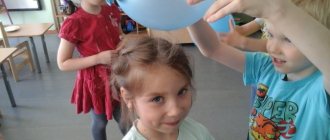“Formation of elementary mathematical concepts using educational games”
- development of accurate, reasoned and demonstrative speech, enrichment of the child’s vocabulary;
— development of children’s activity and initiative;
— fostering readiness for learning at school: developing independence, responsibility, perseverance in overcoming difficulties, coordination of eye movements and fine motor skills of the hands, self-control and self-esteem skills.
Currently, the following means of forming elementary mathematical concepts are widely used in the practice of preschool institutions::
— sets of visual teaching materials for classes;
— equipment for independent games and activities for children;
— methodological manuals for kindergarten teachers, which reveal the essence of the work on the formation of elementary mathematical concepts in children in each age group, and provide approximate lesson notes;
— a group of didactic games and exercises for the formation of quantitative, spatial and temporal concepts in preschoolers;
— educational and educational books for preparing children to master mathematics at school in a family environment.
The main teaching tool is a set of visual didactic materials for classes. It includes the following:
- environmental objects taken in their natural form: various household items, toys, dishes, buttons, cones, acorns, pebbles, shells, etc.;
— images of objects: flat, contour, colored, on stands and without them, drawn on cards;
— graphic and schematic tools: logical blocks, figures, cards, tables, models.
Developmental education technology
involves the interaction of a teacher and a child on the basis of collective distribution activities, the search for various ways to solve various problems through the organization of dialogue in the research and search activities of students.
Developmental education technology
includes stimulating the child’s reflexive abilities, teaching self-control and self-esteem skills.
In the last decade, issues of developmental education have been closely considered in connection with the integration of program tasks, the integration of different types of activities, this is especially typical for teaching preschoolers mathematics. At the same time, it is necessary to distinguish when mathematical activity is used as the main activity, and when, on the contrary, as a part (in art or musical activity, etc.).
The main form of work with preschoolers and their leading activity is play. Guided by one of the principles of the Federal State Educational Standard, the program is implemented using various forms specific to children of a given age group and, above all, in the form of a game.
Intellectual development of children of senior preschool age through FEMP
Municipal budgetary institution
additional education
children's creativity center in Temirgoevskaya village
“Intellectual development of children of senior preschool age through FEMP”
Additional education teacher
education FEDORTSOVA E.P.
Temirgoevskaya village, 2020
“Intellectual development of children of senior preschool age through FEMP”
Preschool childhood –
a very important period in the life of children.
It is at this age that every child is a little explorer, discovering with joy and surprise the unfamiliar and amazing world around him, and in order for every little person to feel confident in the future, to be able to find the right way out of the current situation, to make a quick decision, it is necessary to deal with it intellectual development
. Raising and teaching children in the “Firefly” studio is educational in nature and takes into account two areas of children’s acquisition of knowledge and skills: the child’s extensive communication with adults and peers, and the organized educational process.
«Smart childhood
“lays a good foundation for the intellectual activity of the individual.
Preschool age
- a favorable period for the development of intelligence, it is at this time that progressive changes occur in many areas, mental processes (attention, memory, perception) are improved, personal qualities are actively developed, and on their basis - abilities and inclinations.
Preschool age
– this is the beginning of a long road into the world of miracles, knowledge and discoveries. It is at this time that children lay the foundation for further learning. And the main task of the teacher is to teach them not only to count and read, but above all to think.
Development of intellectual abilities of preschool children
– one of the pressing problems of our time. Preschoolers with developed intelligence remember material faster, are more confident in their abilities, adapt more easily to a new environment, and are better prepared for school.
The basis of human intelligence
, its sensory experience is laid down in the first years of a child’s life. In preschool childhood, the formation of the first forms of abstraction, generalization of simple conclusions, the transition from practical to logical, the development of perception, attention, memory, and imagination occurs.
Intellectual abilities in preschool children
develop better if you adhere to, as psychologists believe, the principle of a high level of difficulty in your work. When a child does not face obstacles that can be overcome, their development is weak and sluggish.
Each child is talented in his own way, each has significant creative potential. Intellectual abilities are not a talent, but a skill that one can develop.
So what is the intellectual development of a child?
Child's intellectual development
– the sum of knowledge and skills, the ability to assimilate and apply this knowledge in solving non-standard situations. But it should be understood that the RRI is not predetermined. Therefore, we teachers who are interested in RRI must direct the child’s energy in the right direction.
Intellectual development of children
– is of particular importance for preparing children for school. After all, it is important not only what knowledge a child has by the time he enters school. And is he ready to acquire new knowledge, is he able to reason, fantasize, draw independent conclusions, and create ideas for essays, drawings, and designs?
The leading role in intellectual development belongs to systematic intellectual education.
a huge role in mental education and development of intelligence .
It is known that Mathematics
– a powerful factor in the intellectual development of a child, the formation of his cognitive and creative abilities.
Children are amazingly active and inquisitive; they simply, like a sponge, absorb everything that happens around them.
Development of elementary mathematical concepts
- This is an extremely important part of the intellectual and personal development of a preschooler. And the success of his further education largely depends on how well and in a timely manner the child is prepared for school.
In teaching children to develop elementary mathematical concepts, I set myself the goal
– to create in pupils an interest in mathematics, to develop the ability to think independently, reason, analyze, understand its significance for subsequent learning, to give the child the feeling that he can cope, that he can learn not only the particular concepts of mathematics, but also general laws. Create a situation of success, and most importantly, experience the joy of overcoming difficulties.
Mathematics
– has a unique developmental effect.
Mathematics is the queen of all sciences
! And it’s hard to disagree with this, because the world around us exists in space and time. It is tangible, quantifiable, measurable. We use knowledge of mathematics every day.
She clears her mind!
Its study contributes to the development of memory, speech, imagination, and emotions.
And although mathematics is one of the most difficult subjects, our students should never learn about it, because our goal is to teach the child to comprehend this science with interest and pleasure.
I believe that teaching children mathematics in preschool age contributes to the formation and improvement of intellectual abilities: logic of thought, reasoning and action, flexibility of the thought process, ingenuity and ingenuity, and the development of creative thinking.
Practice has shown that preschoolers show cognitive interest in mathematics only when they are intrigued and amazed by something unknown to them. In this case, the information looks interesting, almost magical, in their eyes. Our task is to make FEMP classes entertaining and unusual.
The educational standard of the new generation sets new goals for preschool education that require new educational technologies.
A modern preschooler, to successfully study at school, must be able to:
1. Ponder.
2. Gain knowledge independently.
3. Think.
4. Make decisions.
5. Present the product.
Modern educational technology, more than ever, relies on the intellectual development of a preschooler. Game learning fully corresponds to this concept.
Everyone loves to play: both adults and children.
A preschool child is a person who plays, therefore the standard stipulates that learning enters the child’s life through the gates of children’s play.
The relevance of the topic is due to the fact that a child’s personal qualities are formed in active activities, and above all in those activities that are leading at each age stage and determine his interests, attitude to reality, and the characteristics of relationships with people around him. In preschool age, such a leading activity is play.
What is a game?
Play is an activity in which a child first emotionally and then intellectually masters the entire system of human relationships.
A game -
What could be more interesting and meaningful for the guys! This is joy, knowledge, and creativity. This is what a child comes to our studio for.
Features of the game for preschoolers:
— the game is the most accessible and leading type of activity;
- play is an effective means of shaping all aspects of a child’s personality, his moral and volitional qualities;
- all psychological new formations originate in the game;
-game is an important means of mental education of a child, where mental activity is associated with the work of all mental processes.
It has long been proven that every child from birth is endowed with enormous mental potential, which, under favorable conditions, develops effectively and enables the child to reach great heights in his development, and only in play does the child joyfully and easily, like a flower under the sun, reveal his creative abilities and knowledge. In the game, perception, thinking, memory, speech are formed - those fundamental mental processes, without sufficient development of which it is impossible to talk about the development of the child’s intellect.
A game
- This is a natural, humane form of education for a child.
By teaching through play, we teach children not how it is convenient for us to give educational material, but how it is convenient and natural for children to take it. Without play, normal development of the brain and body is impossible. To understand the nature of play, its amazing potential, is to understand the nature of a happy childhood.
Children are the creators of the present and the future.
This is the charm of the game.
For preschool children, play is of exceptional importance:
Play is learning for them,
Play for them is work,
Play for them is a serious form of education.
Preschool age is the age of play.
In my work on the intellectual development of children, I use a comprehensive gaming method. It is based on educational games. “play” with children
into mathematics. But teaching mathematics to preschool children is unthinkable without the use of entertaining games, tasks, and entertainment. Children are very active in the perception of tasks - jokes, puzzles, logical exercises. They persistently search for a solution that leads to a result.
Of all the variety of entertaining mathematical material in preschool age, didactic games are most used .
The formation of mathematical concepts in children is facilitated by the use of a variety of didactic games.
Didactic games
– games in which cognitive activity is combined with gaming activity. On the one hand, a didactic game is one of the forms of influence of an adult on a child, and on the other hand, a game is the main type of independent activity of children.
They allow preschoolers to expand their knowledge, consolidate their ideas about quantity, size, geometric shapes, and teach them to navigate in space and time. That is why I pay great attention to didactic games in the process of FEMP; this is primarily due to the fact that their main goal is educational.
Namely, a game with educational elements that is interesting to a child will help in the development of a preschooler’s cognitive abilities.
Didactic games for the formation of mathematical concepts are conventionally divided into the following groups:
1. games with numbers and numbers.
2. time travel games.
3. games for spatial orientation.
4. games with geometric shapes.
5. games for logical thinking.
Independent play activity.
This type of activity is extremely important for the development of a child, since in independent games the ability to improve skill and intelligence is trained, and most importantly, an unlimited opportunity to invent and create is revealed.
Do you want your children to be capable and talented?
Then help them take the first steps on the steps of creativity, but... don’t be late and, while helping..., think for yourself!
By teaching children through play, I strive to ensure that the joy of play turns into the joy of learning!
Learning should be joyful!!!
Conclusion
: So, in my opinion, without the use of didactic mathematical games, the development of cognitive activity, logical thinking, memory, creativity and other personal qualities is impossible.
Their diversity and accessibility help us successfully plan and implement assigned tasks, both in collective and individual work with children, which is the key to the successful intellectual development of children of senior preschool age
and, as a consequence, their subsequent schooling.
Downloaded from www.znanio.ru




